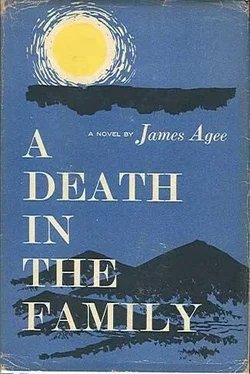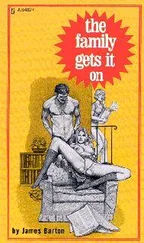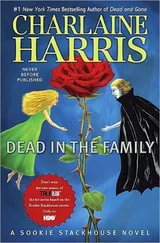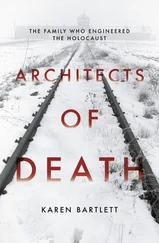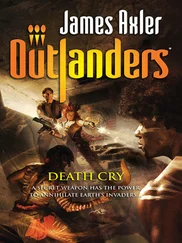People go by; things go by. A horse, drawing a buggy, breaking his hollow iron music on the asphalt; a loud auto, a quiet auto, people in pairs, not in a hurry, scuffling, switching their weight of aestival body, talking casually, the taste hovering over them of vanilla, straw berry, pasteboard and starched milk, the image upon them of lovers and horsemen, squared with clowns in hueless amber. A street car raising its iron moan, stopping, belting and starting; stertorous; rousing and raising again its iron increasing moan and swimming its gold windows and straw seats on past and past and past, the bleak spark crackling and cursing above it like a small malignant spirit set to dog its tracks; the iron whine rises on rising speed; still risen, faints, halts; the faint stinging bell, rises again, still fainter, fainting, lifting, lifts, faints forgone: forgotten. Now is the night one blue dew.
Now is the night one blue dew, my father has drained, he has coiled the hose.
Low on the length of lawns, a (railing of fire who breathes.
Content, silver, like peeps of light, each cricket makes his comment over and over in the drowned grass.
A cold toad thumpily flounders.
Within the edges of damp shadows of side yards are hovering children nearly sick with joy of fear, who watch the unguarding of a telephone pole.
Around white carbon corner lamps bugs of all sizes are lifted elliptic, solar systems. Big hardshells bruise themselves, assailant: he is fallen on his back, legs squiggling.
Parents on porches. rock and rock: From damp strings morning glories: hang their ancient faces.
The dry and exalted noise of the locusts from all the air at once enchants my eardrums.
On the rough wet grass of the back yard my father and mother have spread quilts. We all lie there, my mother, my father, my uncle, my aunt, and I too am lying there. First we were sitting up, then one of us lay down, and then we all lay down, on our stomachs, or on our sides, or on our backs, and they have kept on talking. They are not talking much, and the talk is quiet, of nothing in particular, of nothing at all in particular, of nothing at all. The stars are wide and alive, they seem each like a smile of great sweetness, and they seem very near. All my people are larger bodies than mine, quiet, with voices gentle and meaningless like the voices of sleeping birds. One is an artist, he is living at home. One is a musician, she is living at home. One is my mother who is good to me. One is my father who is good to me. By some chance, here they are, all on this earth; and who shall ever tell the sorrow of being on this earth, lying, on quilts, on the grass, in a summer evening, among the sounds of the night. May God bless my people, my uncle, my aunt, my mother, my good father, oh, remember them kindly in their time of trouble; and in the hour of their taking away.
After a little I am taken in and put to bed. Sleep, soft smiling, draws me unto her: and those receive me, who quietly treat me, as one familiar and well-beloved in that home: but will not, oh, will not, not now, not ever; but will not ever tell me who I am.
At supper that night, as many times before, his father said, "Well, spose we go to the picture show."
"Oh, Jay!" his mother said. "That horrid little man!"
"What's wrong with him?" his father asked, not because he didn't know what she would say, but so she would say it.
"He's so nasty!" she said, as she always did. "So vulgar! With his nasty little cane; hooking up skirts and things, and that nasty little walk!"
His father laughed, as he always did, and Rufus felt that it had become rather an empty joke; but as always the laughter also cheered him; he felt that the laughter enclosed him with his father.
They walked downtown in the light of mother-of-pearl, to the Majestic, and found their way to seats by the light of the screen, in the exhilarating smell of stale tobacco, rank sweat, perfume and dirty drawers, while the piano played fast music and galloping horses raised a grandiose flag of dust. And there was William S. Hart with both guns blazing and his long, horse face and his long, hard lip, and the great country rode away behind him as wide as the world. Then he made a bashful face at a girl and his horse raised its upper lip and everybody laughed, and then the screen was filled with a city and with the sidewalk of a side street of a city, a long line of palms and there was Charlie; everyone laughed the minute they saw him squattily walking with his toes out and his knees wide apart, as if he were chafed; Rufus' father laughed, and Rufus laughed too. This time Charlie stole a whole bag of eggs and when a cop came along he hid them in the seat of his pants. Then he caught sight of a pretty woman and he began to squat and twirl his cane and make silly faces. She tossed her head and walked away with her chin up high and her dark mouth as small as she could make it and he followed her very busily, doing all sorts of things with his cane that made everybody laugh, but she paid no attention. Finally she stopped at a corner to wait for a streetcar, turning her back to him, and pretending he wasn't even there, and after trying to get her attention for a while, and not succeeding, he looked out at the audience, shrugged his shoulders, and acted as if she wasn't there. But after tapping his foot for a little, pretending he didn't care, he became interested again, and with a charming smile, tipped his derby; but she only stiffened, and tossed her head again, and everybody laughed. Then he walked back and forth behind her, looking at her and squatting a little while he walked very quietly, and everybody laughed again; then he flicked hold of the straight end of his cane and, with the crooked end, hooked up her skirt to the knee, in exactly the way that disgusted Mama, looking very eagerly at her legs, and everybody laughed very loudly; but she pretended she had not noticed. Then he twirled his cane and suddenly squatted, bending the cane and hitching up his pants, and again hooked up her skirt so that you could see the panties she wore, ruffled almost like the edges of curtains, and everybody whooped with laughter, and she suddenly turned in rage and gave him a shove in the chest, and he sat down straight-legged, hard enough to hurt, and everybody whooped again; and she walked haughtily away up the street, forgetting about the streetcar, "mad as a hornet!" as his father exclaimed in delight; and there was Charlie, flat on his bottom on the sidewalk, and the way he looked, kind of sickly and disgusted, you could see that he suddenly remembered those eggs, and suddenly you remembered them too. The way his face looked, with the lip wrinkled off the teeth and the sickly little smile, it made you feel just the way those broken eggs must feel against your seat, as queer and awful as that time in the white pekay suit, when it ran down out of the pants-legs and showed all over your stockings and you had to walk home that way with people looking; and Rufus' father nearly tore his head off laughing and so did everybody else, and Rufus was sorry for Charlie, having been so recently in a similar predicament, but the contagion of laughter was too much for him, and he laughed too. And then it was even funnier when Charlie very carefully got himself up from the sidewalk, with that sickly look even worse on his face, and put his cane under one arm, and began to pick at his pants, front and back, very carefully, with his little fingers crooked, as if it were too dirty to touch, picking the sticky cloth away from his skin. Then he reached behind him and took out the wet bag of broken eggs and opened it and peered in; and took out a broken egg and pulled the shell disgustedly apart, letting the elastic yolk slump from one half shell into the other, and dropped it, shuddering. Then he peered in again and fished out a whole egg, all slimy with broken yolk, and polished it off carefully on his sleeve, and looked at it, and wrapped it in his dirty handkerchief, and put it carefully into the vest pocket of his little coat. Then he whipped out his cane from under his armpit and took command of it again, and with a final look at everybody, still sickly but at the same time cheerful, shrugged his shoulders and turned his back and scraped backward with his big shoes at the broken shells and the slimy bag, just like a dog, and looked back at the mess (everybody laughed again at that) and started to walk away, bending his cane deep with every shuffle, and squatting deeper, with his knees wider apart, than ever before, constantly picking at the seat of his pants with his left hand, and shaking one foot, then the other, and once gouging deep into his seat and then pausing and shaking his whole body, like a wet dog, and then walking on; while the screen shut over his small image a sudden circle of darkness: then the player-piano changed its tune, and the ads came in motionless color. They sat on into the William S. Hart feature to make sure why he had killed the man with the fancy vest-it was as they had expected by her frightened, pleased face after the killing; he had insulted a girl and cheated her father as well-and Rufus' father said, "Well, reckon this is where we came in," but they watched him kill the man all over again; then they walked out.
Читать дальше
